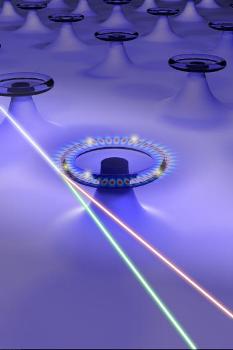A research team at the St Louis’ Washington University and China’s Tsinghua University has collaborated to develop the Raman microlaser sensor that has the capability to not only detect but also count individual nanoparticles. The sensor can detect nanoparticles that are as small as 10nm.
 The image shows arrays of self-referenced and self-heterodyned Whispering-Gallery Raman microlasers for single nanoparticle detection. Credit: J. Zhu, B. Peng, S.K. Ozdemir, L. Yang
The image shows arrays of self-referenced and self-heterodyned Whispering-Gallery Raman microlasers for single nanoparticle detection. Credit: J. Zhu, B. Peng, S.K. Ozdemir, L. Yang
The sensor was created in a silicon dioxide chip without the need for doping with rare-earth ions. These ions are normally used to render optical gain to the microlaser. Raman lasing was integrated in the silica microcavity using the mode splitting method developed by the team. This development will be beneficial to a wide range of fields including electronics, plasmonics, metamaterials, biomedical, and acoustics fields.
The Raman microlaser sensor belongs to the whispering gallery mode resonators (WGMR) class. Earlier resonators were dependent on morphology and mirrors were not used for light reflection. This mini-laser sensor supports excitation patterns in its doughnut-shaped ring that are of identical frequencies. These patterns are termed as “frequency degenerate modes”. Usually, specific wavelength bands are required for pump lasers. However, employing the Raman process does away with this requirement, as pumps belonging to any wavelength band can be used for obtaining Raman gain. This enables customizing the lasing frequency to suit the specific sensing environment.
When a Raman laser beam hits a nanoparticle, it splits and generates lasing lines. These lines act as reference to each other for sensing the particles.
This study was led by Lan Yang, the Das Family Career Development Associate Professor in Electrical & Systems Engineering at the Washington University in St. Louis and it has been published in the online Early Edition of the Proceedings of the National Academy of Sciences.
References